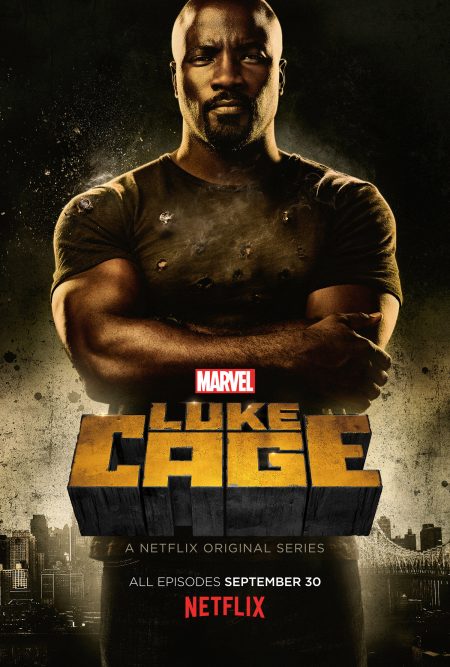If the first two episodes of Luke Cage were like watching superhero Shakespeare, then "Who’s Gonna Take the Weight” is all about becoming an emotional catharsis to answer our pent-up frustration with tragedy. When people talk about Shakespeare or when they call something Shakespearean, they’re usually talking about dudes in puffy shirts, star-crossed characters, and big speeches. You won't catch me doing that, though. I'd offer up , rather, that at the core of every Shakespeare play are characters who are driven by complex needs and forced to navigate their complex social and political hierarchies. They’re a realm of emotional politicking and that description is what the first two episodes of Luke Cage felt like.
Harlem is a living and breathing place here. There are lines drawn in the sand and desperate people willing to poke and prod them to find what they want. Some characters want money, some want power and others justice. Luke Cage just wants to be left the hell alone.
So far we've seen people get what they want and get what they wanted, launching their intersecting paths into an unavoidable climax that ended the second episode.
There’s a reason so many of Shakespeare’s plays end in tragedy. Why so many are filled with thankless if inevitable deaths and chaotically uprooted social structures. It’s that they’re made-up of people and people are selfish and destructive even when they want to do the right thing.
Luke Cage, however, came with a promise of not being a tragedy. A bullet-proof black man entering the cultural consciousness at a time when we are surrounded by the real faces of wrongfully slain black men and women by the police promised to protect them.
Luke Cage cannot be a tragedy.
From the very first episode, people on the sidelines have been telling Luke to use his powers and change things. The cops are too ineffectual to do anything. The politicians are in bed with the criminals. Luke uniquely stands with abilities and incorruptibility to do something and this episode is when it finally starts to happen.
When Luke fights back, it feels good. The choreography is sloppy and the action undeniably campy but it almost has to be. We need to understand the invincibility of Luke; we have to bear witness to what happens to the people who point a gun at a bulletproof man.
The show’s style is hugely carried by its soundtrack and that’s no better delivered than here. When the Wu-Tang Clan’s “Bring da Ruckus” starts thumping and Cage storms a fortress nestled in the heart of Harlem, it feels good. Doesn’t matter if a bunch of dudes clumsily swing machetes, the scene moves in tune with the music you believe everything.
This moment of righteous justice from Luke makes it a strange choice for this episode to be where the morals of vigilantism get questioned. Misty Knight debates with her partner what role super-powered vigilantes play in a world with the Avengers. Where should these powered individuals stand while the police try to do their jobs?
This is a question the Netflix shows have summarily avoided and desperately needs to be addressed in superhero film and tv. Real world vigilantism never ends well for anyone. These people are ill-equipped and unaccountable making them a danger not just to themselves but everyone around them. Without protocol, they invite mistakes and recklessness—a type of danger that this season later tries addressing but ultimately proves ill-equipped to handle.
TV shows like the Wire tried and succeeded in showing what happens when someone wages a one-man war against gangs and drug dealers. They’re heroes but there’s a tragic inevitability to their struggle as men can never be legends.
Luke Cage, however, can be. He’s super strong, super tough and a licensed brand.
Here even the show’s narrative betrays Misty’s reasoning. We saw with our own eyes what happens when no one pushes back against the bad. We saw Pop die. We saw a community torn to shreds while the cops kept their hands behind their backs and twiddled their thumbs.
For those who read ahead, we already know that inevitably Misty will not even believe her own words which is unfortunate because this is a solid question to ask.
Coming from this show, though, it’s unsurprising. Not just because the role's role as wish-fulfillment about a bulletproof black man in a social climate where they’re shot nearly daily on the street but because of the show’s troubling love of excess.
Episode three ends on a note that sours—something resembling a Wile E. Coyote cartoon more than a proper political and race driven narrative so many people wanted this to be. That’s because when this show gets drunk on its own internal bombast, it gets sloppy. So in love are they for the moments when Luke wraps a car door around a confused thug, they never stop to ask if they should pump the brakes.
While that becomes a greater problem for the series as a whole, at this point in the season it’s okay.
Just lean back and enjoy seeing a bulletproof man clean the streets and bring da ruckus.
[su_box title="Score: 4/5" style="glass" box_color="#8955ab" radius="6"]
Luke Cage E.03 - "Who's Gonna Take the Weight" Director: Guillermo Navarro [/su_box]
